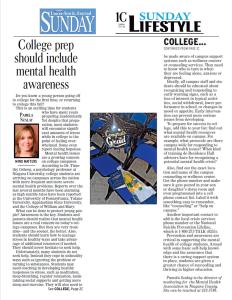
Graduation is typically a day of hope, but parents should help prepare recent high school grads for the stresses of college, says Mind Matters columnist Pamela Szalay.
Do you know a young person going off to college for the first time, or returning to college this fall?
This is an exciting time for students who have spent years preparing academically. Yet despite that preparation, most students will encounter significant amounts of stress while in college to the point of feeling overwhelmed. Some even report feeling hopeless. Mental health issues are a growing concern on college campuses. According to Dr. Timothy Osberg, a psychology professor at Niagara University, college students are arriving on campuses across the nation with more frequent and more severe mental health problems. Reports over the last several months have been alarming as high suicide rates have been reported at the University of Pennsylvania, Tulane University, Appalachian State University, and the College of William and Mary.
What can be done to protect young people? Awareness is the key. Students and parents should realize that mental health issues are a real concern on today’s college campuses. But they are very treatable— and the sooner, the better. Also, students should learn how to manage stress in healthy ways and take advantage of additional resources if needed. They should never hesitate to seek help.
Unfortunately, many students do not seek help. Instead they cope in unhealthy ways such as ignoring the problem or turning to substances. Students may need coaching in developing healthy responses to stress, such as meditation, deep-breathing, regular relaxation, maintaining social supports and getting more sleep and exercise. They will also need to be made aware of campus support systems such as wellness centers or counseling services. They need to know who to turn to when they are feeling alone, anxious or depressed.
Ideally, all campus staff and students should be educated about recognizing and responding to early warning signs, such as a loss of interest in typical activities, social withdrawal, lower performance in school, or changes in mood or appetite. Early intervention can prevent more serious issues from developing.
To prepare for success in college, add this to your list: find out what mental health resources are available on campus. For example, what protocols are there campus-wide for responding to mental health issues? What kind of training do Residence Hall advisors have for recognizing a potential mental health crisis?
Also, find out the exact location and name of the campus counseling or wellness center.
Get the phone number and make sure it gets posted in your son or daughter’s dorm room and even programmed into a cell phone contact list. Label it with something easy to remember, like “counseling” or “help on campus.”
Another important contact to add is the local crisis services* phone number or the National Suicide Prevention Lifeline, which is 1-800-273-TALK (8255).
Prevention and awareness are critical in supporting the mental health of college students. Armed with some basic self-help knowledge and the assurance that there is a caring support system in place, students are given a greater chance of succeeding and thriving in higher education.
*For assistance in Niagara County, NY, please call the Help Line at (716) 433-5432 or visit the online Help Book.
Original publication date: July 5, 2015. Mind Matters is a regular column of the Niagara Gazette and Lockport Union-Sun Journal.
 Pamela Szalay is the Director of Marketing and Operations at the Mental Health Association in Niagara County Inc. and provides educational presentations and workshops on mental health topics for the community. You can reach her by email.
Pamela Szalay is the Director of Marketing and Operations at the Mental Health Association in Niagara County Inc. and provides educational presentations and workshops on mental health topics for the community. You can reach her by email.
To download an easy-to-print version of this column click here.
